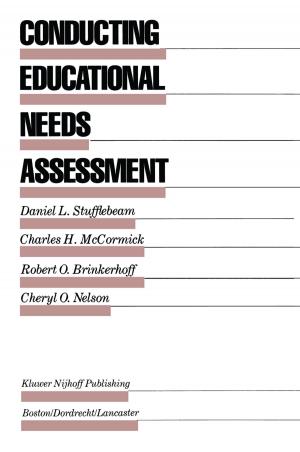| Author: | ISBN: | 9789401023870 | |
| Publisher: | Springer Netherlands | Publication: | December 6, 2012 |
| Imprint: | Springer | Language: | English |
| Author: | |
| ISBN: | 9789401023870 |
| Publisher: | Springer Netherlands |
| Publication: | December 6, 2012 |
| Imprint: | Springer |
| Language: | English |
In an age which is supposedly experiencing a sexual revolution, a volume of thoughtful essays on eros is not only not out of place but perhaps is a positive contribution to the understanding of contempor ary man. It was the conviction of the editors that the scientific view of sexuality, as promoted in such valuable studies as those conducted by Masters and Johnson, needed considerable supplement and per spective. The perspective is here furnished by writers from both Europe and America, authors from various fields, such as philosophy, psychology, and even musicology, all of whom are united, in that their approach to the problem of eros is phenomenologically oriented. At first it might well seem strange that musicology would have much to say about eros. It is true, musicology has been the "science" of music, at least in intent. Yet in a larger view of the discipline, philo sophical and aesthetic problems are also important to it, and this particularly if we agree with Enzo Paci, that our very culture depends on eros. Surely musical culture, as pointed out by Kierkegaard, is the embodiment of what western civilization has known as sensuality; and Mozart's Don Giovanni is its incarnation. On the surface it is easier for us to grasp the work of the philosopher in this area; and, of course, one expects the psychologist to deal with sexuality more explicitly than anyone else.
In an age which is supposedly experiencing a sexual revolution, a volume of thoughtful essays on eros is not only not out of place but perhaps is a positive contribution to the understanding of contempor ary man. It was the conviction of the editors that the scientific view of sexuality, as promoted in such valuable studies as those conducted by Masters and Johnson, needed considerable supplement and per spective. The perspective is here furnished by writers from both Europe and America, authors from various fields, such as philosophy, psychology, and even musicology, all of whom are united, in that their approach to the problem of eros is phenomenologically oriented. At first it might well seem strange that musicology would have much to say about eros. It is true, musicology has been the "science" of music, at least in intent. Yet in a larger view of the discipline, philo sophical and aesthetic problems are also important to it, and this particularly if we agree with Enzo Paci, that our very culture depends on eros. Surely musical culture, as pointed out by Kierkegaard, is the embodiment of what western civilization has known as sensuality; and Mozart's Don Giovanni is its incarnation. On the surface it is easier for us to grasp the work of the philosopher in this area; and, of course, one expects the psychologist to deal with sexuality more explicitly than anyone else.















